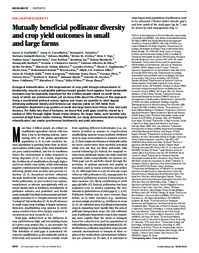Mutually beneficial pollinator diversity and crop yield outcomes in small and large farms.
Mutually beneficial pollinator diversity and crop yield outcomes in small and large farms.
Author(s): GARIBALDI, L. A.; CARVALHEIRO, L. G.; VAISSIÈRE, B. E.; GEMMILL-HERREN, B.; HIPÓLITO, J.; FREITAS, B. M.; NGO, H. T.; AZZU, N.; SÁEZ, A.; ASTROM, J.; AN, J.; BLOCHTEIN, B.; BUCHORI, D.; CHAMORRO GARCÍA, F. J.; SILVA, F. O. da; DEVKOTA, K.; RIBEIRO, M. de F.; FREITAS, L.; GAGLIANONE, M. C.; GOSS, M.; IRSHAD, M.; KASINA, M.; PACHECO FILHO, A. J. S.; KIILL, L. H. P.; KWAPONG, P.; NATES PARRA, G.; PIRES, C. S. S.; PIRES, V.; RAWAL, R. S.; RIZALI, A.; SARAIVA, A. M.; VELDTMAN, R.; VIANA, B. F.; WITTER, S.; ZHAN, H.
Summary: Ecological intensification, or the improvement of crop yield through enhancement of biodiversity, may be a sustainable pathway toward greater food supplies. Such sustainable increases may be especially important for the 2 billion people reliant on small farms, many of which are undernourished, yet we know little about the efficacy of this approach. Using a coordinated protocol across regions and crops, we quantify to what degree enhancing pollinator density and richness can improve yields on 344 fields from 33 pollinator-dependent crop systems in small and large farms from Africa, Asia, and Latin America. For fields less than 2 hectares, we found that yield gaps could be closed by a median of 24% through higher flower-visitor density. For larger fields, such benefits only occurred at high flower-visitor richness. Worldwide, our study demonstrates that ecological intensification can create synchronous biodiversity and yield outcomes.
Publication year: 2016
Types of publication: Journal article
Unit: Embrapa Semi-arid Region
Observation
Some of Embrapa's publications are published as ePub files. To read them, use or download one of the following free software options to your computer or mobile device. Android: Google Play Books; IOS: iBooks; Windows and Linux: Calibre.
Access other publications
Access the Agricultural Research Database (BDPA) to consult Embrapa's full library collection and records.
Visit Embrapa Bookstore to purchase books and other publications sold by Embrapa.

